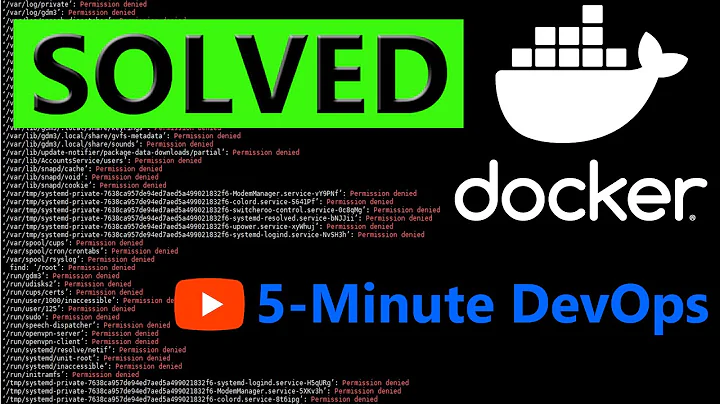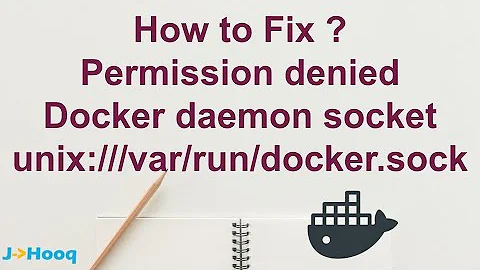Permission denied to Docker daemon socket at unix:///var/run/docker.sock
Solution 1
The permission matching happens only on numeric user ID and group ID. If the socket file is mode 0660 and owned by user ID 0 and group ID 32, and you're calling it as a user with user ID 1000 and group IDs 1000 and 16, it doesn't matter if one /etc/group file names gid 32 as docker and the other one names gid 16 the same; the numeric gids are different and you can't access the file. Also, since the actual numeric gid of the Docker group will vary across systems, this isn't something you can bake into the Dockerfile.
Many Docker images just run as root; if they do, they can access a bind-mounted Docker socket file regardless of its permissions.
If you run as a non-root user, you can use the docker run --group-add option to add a (numeric) gid to the effective user; it doesn't specifically need to be mentioned in the /etc/groups file. On a Linux host you might run:
docker run --group-add $(stat -c '%g' /var/run/docker.sock) ...
You wouldn't usually install sudo in a Dockerfile (it doesn't work well for non-interactive programs, you usually don't do a whole lot in interactive shells because of the ephemeral nature of containers, and you can always docker exec -u 0 to get a root shell) though installing some non-root user is often considered a best practice. You could reduce the Dockerfile to
FROM node:8
RUN apt-get update
# Trying to use the host's `docker` binary may not work well
RUN apt-get install -y docker.io
# Install the single node tool you need
RUN npm install -g gulp
# Get your non-root user
RUN adduser myusername
# Normal Dockerfile bits
WORKDIR ...
COPY ...
RUN gulp
USER myusername
CMD ["npm", "run", "start"]
(That Docker base image has a couple of things that don't really match Docker best practices, and doesn't seem to be updated routinely; I'd just use the standard node image as a base and add the one build tool you need on top of it.)
Solution 2
A quick way to avoid that. Add your user to the group.
sudo gpasswd -a $USER docker
Then set the proper permissions.
sudo setfacl -m user:<your username>:rw /var/run/docker.sock
Should be good from there.
Solution 3
open terminal and type this command
sudo chmod 666 /var/run/docker.sock
let me know the results...
Related videos on Youtube
Jimmix
Bachelor of Engineering, Software Developer. Technology stack: HTML, CSS, JavaScript, PHP, Bash, MySQL, Linux, Docker. You may reach me via my Linkedin profile (you need to be logged in to see my profile).
Updated on July 29, 2021Comments
-
 Jimmix about 1 year
Jimmix about 1 yearI have this
Dockerfile:FROM chekote/gulp:latest USER root RUN apt-get update \ && apt-get upgrade -y \ && apt-get install -y sudo libltdl-dev ARG dockerUser='my-user-name'; ARG group='docker'; # crate group if not exists RUN if ! grep -q -E "^$group:" /etc/group; then groupadd $group; fi # create user if not exists RUN if ! grep -q -E "^$dockerUser:" /etc/passwd; then useradd -c 'Docker image creator' -m -s '/bin/bash' -g $group $dockerUser; fi # add user to the group (if it was present and not created at the line above) RUN usermod -a -G ${group} ${dockerUser} # set default user that runs the container USER ${dockerUser}That I build this way:
docker build --tag my-gulp:latest .and finally run by
scriptthis way:#!/bin/bash image="my-gulp:latest"; workDir='/home/gulp/project'; docker run -it --rm \ -v $(pwd):${workDir} \ -v /var/run/docker.sock:/var/run/docker.sock \ -v /usr/bin/docker:/usr/bin/docker \ ${image} /bin/bashthat logs me into the docker container properly but when I want to see images
docker imagesor try to pull image
docker pull hello-world:latestI get this error:
Got permission denied while trying to connect to the Docker daemon socket at unix:///var/run/docker.sock: Get http://%2Fvar%2Frun%2Fdocker.sock/v1.38/images/json: dial unix /var/run/docker.sock: connect: permission denied
How to create docker image from
chekote/gulp:latestso I can use docker inside it without the error?Or maybe the error is because of wrong docker run command?
-
 scipsycho almost 4 yearsi am not 100% sure, but try
scipsycho almost 4 yearsi am not 100% sure, but try--privilegedtag while running the container. it may work. -
 Jimmix about 3 years@Code Bling This isn't inception, the gulp container does not run docker's containers inside of it but uses host's docker to start other docker's containers that at the same level as gulp container. The docker commands are going from gulp container outwards to the host that runs other containers, so from the host's point of view it is similar to running containers by gulp that is not containerized. Reason: you can easily switch between gulp versions (eg 3.x and 4.x) just by using different containers even there is no gulp at host at all.
Jimmix about 3 years@Code Bling This isn't inception, the gulp container does not run docker's containers inside of it but uses host's docker to start other docker's containers that at the same level as gulp container. The docker commands are going from gulp container outwards to the host that runs other containers, so from the host's point of view it is similar to running containers by gulp that is not containerized. Reason: you can easily switch between gulp versions (eg 3.x and 4.x) just by using different containers even there is no gulp at host at all. -
 Codebling about 3 years@Jimmix oh, that's neat! Still...Inception.
Codebling about 3 years@Jimmix oh, that's neat! Still...Inception.
-
-
 Jimmix almost 4 yearsbut I added
Jimmix almost 4 yearsbut I addedmy-user-nameinDockerfileto thedockergroup didn't I?RUN usermod -a -G ${group} ${dockerUser} -
 Lie Ryan almost 4 yearsYou need to add to docker group the user on the host machine, not the user in the container. Dockerfile's RUN command runs inside the container and cannot affect the host machine.
Lie Ryan almost 4 yearsYou need to add to docker group the user on the host machine, not the user in the container. Dockerfile's RUN command runs inside the container and cannot affect the host machine. -
 Son Tr. almost 4 yearsThis save the day!
Son Tr. almost 4 yearsThis save the day! -
 Sachin Sridhar over 3 yearsShould be on top, Brilliant!
Sachin Sridhar over 3 yearsShould be on top, Brilliant! -
 joseluisq about 3 yearsThanks! This is also a solution for example for running Jenkins in Docker.
joseluisq about 3 yearsThanks! This is also a solution for example for running Jenkins in Docker. -
 Sairam Krish over 2 yearsCan you elaborate on this statement
Sairam Krish over 2 yearsCan you elaborate on this statementTrying to use the hosts docker binary may not work well? I am mounting docker binary in many places to avoid installing docker., -
 David Maze over 2 yearsThe host is MacOS but the container is Linux, so the host's
David Maze over 2 yearsThe host is MacOS but the container is Linux, so the host'sdockerbinary won't work. Both the host and container are Linux but the shared-library dependencies are different. One of the key goals for a Docker image is for it to be totally self-contained, and injecting binaries or code from the host violates this rule. -
 Sairam Krish over 2 yearsI agree with you on injecting binaries is not good. In case of Docker, I do Docker outside of docker (DooS) and it works without issue when I mount MacOS docker binary to Linux container. I believe, if host is Windows, it may not work. But do you see any concern in mounting MacOS docker binary on a Linux container ? This helps to avoid installing docker on container image.
Sairam Krish over 2 yearsI agree with you on injecting binaries is not good. In case of Docker, I do Docker outside of docker (DooS) and it works without issue when I mount MacOS docker binary to Linux container. I believe, if host is Windows, it may not work. But do you see any concern in mounting MacOS docker binary on a Linux container ? This helps to avoid installing docker on container image. -
 David Maze over 2 yearsA MacOS binary will not run in a Linux environment, full stop. Images that depend on code being injected from the host aren't going to be portable and this misses the point of using Docker.
David Maze over 2 yearsA MacOS binary will not run in a Linux environment, full stop. Images that depend on code being injected from the host aren't going to be portable and this misses the point of using Docker. -
 Stephen over 2 yearsDocker documentation details this too: docs.docker.com/engine/install/linux-postinstall
Stephen over 2 yearsDocker documentation details this too: docs.docker.com/engine/install/linux-postinstall -
 Lokesh almost 2 yearsMany thanks for this, especially the
Lokesh almost 2 yearsMany thanks for this, especially thegroup-addflag. It saved me from doing couple of hacks to do its equivalent. -
 Omar Merghany over 1 yearthanks @Mohit Rakhade, worked well for me
Omar Merghany over 1 yearthanks @Mohit Rakhade, worked well for me -
 PAT-O-MATION over 1 yearEasiest answer.
PAT-O-MATION over 1 yearEasiest answer. -
 chaitanya guruprasad over 1 yearThis is the best. Crisp and sweet answer.
chaitanya guruprasad over 1 yearThis is the best. Crisp and sweet answer. -
 ASB about 1 yearBest and Easy!!
ASB about 1 yearBest and Easy!!

